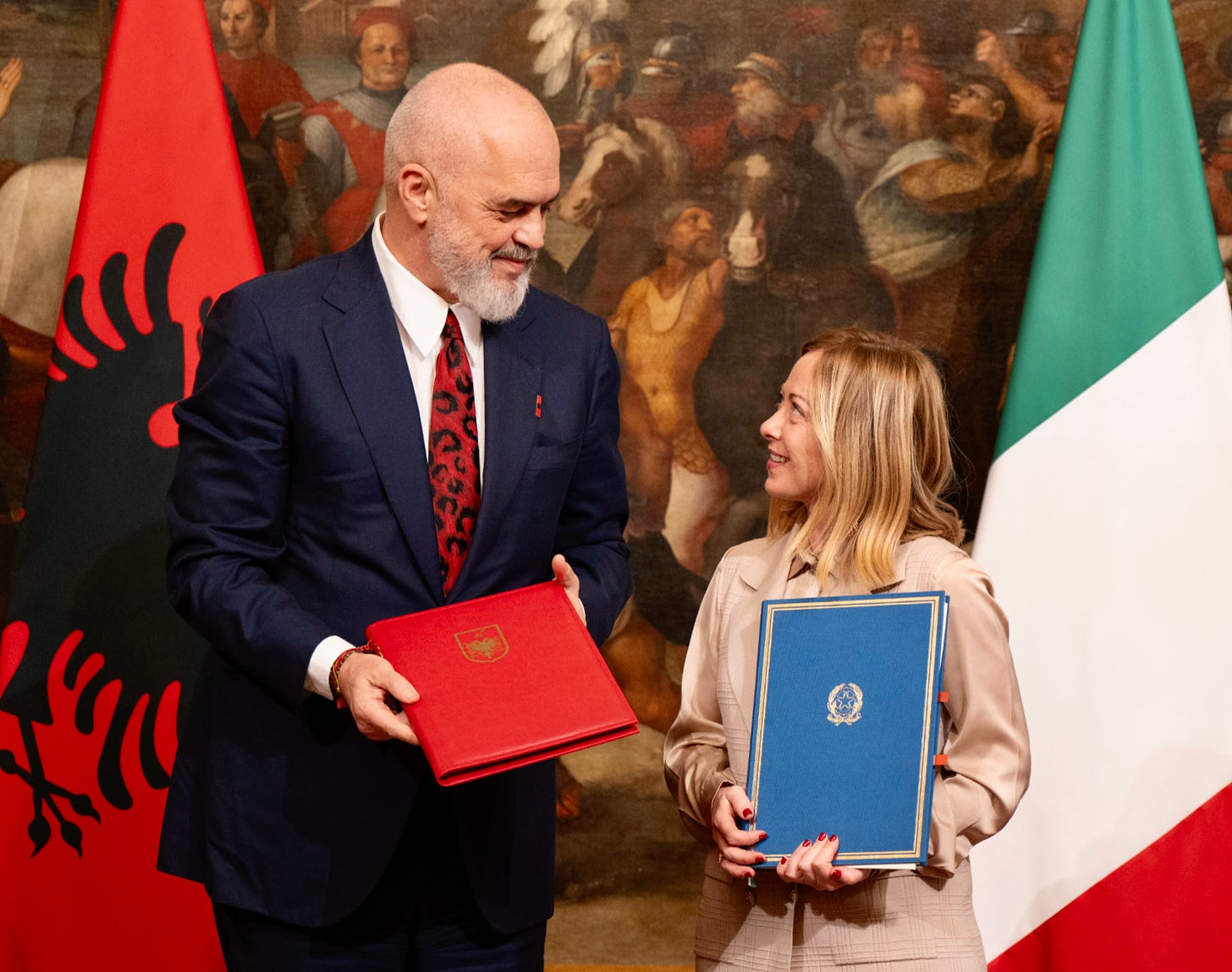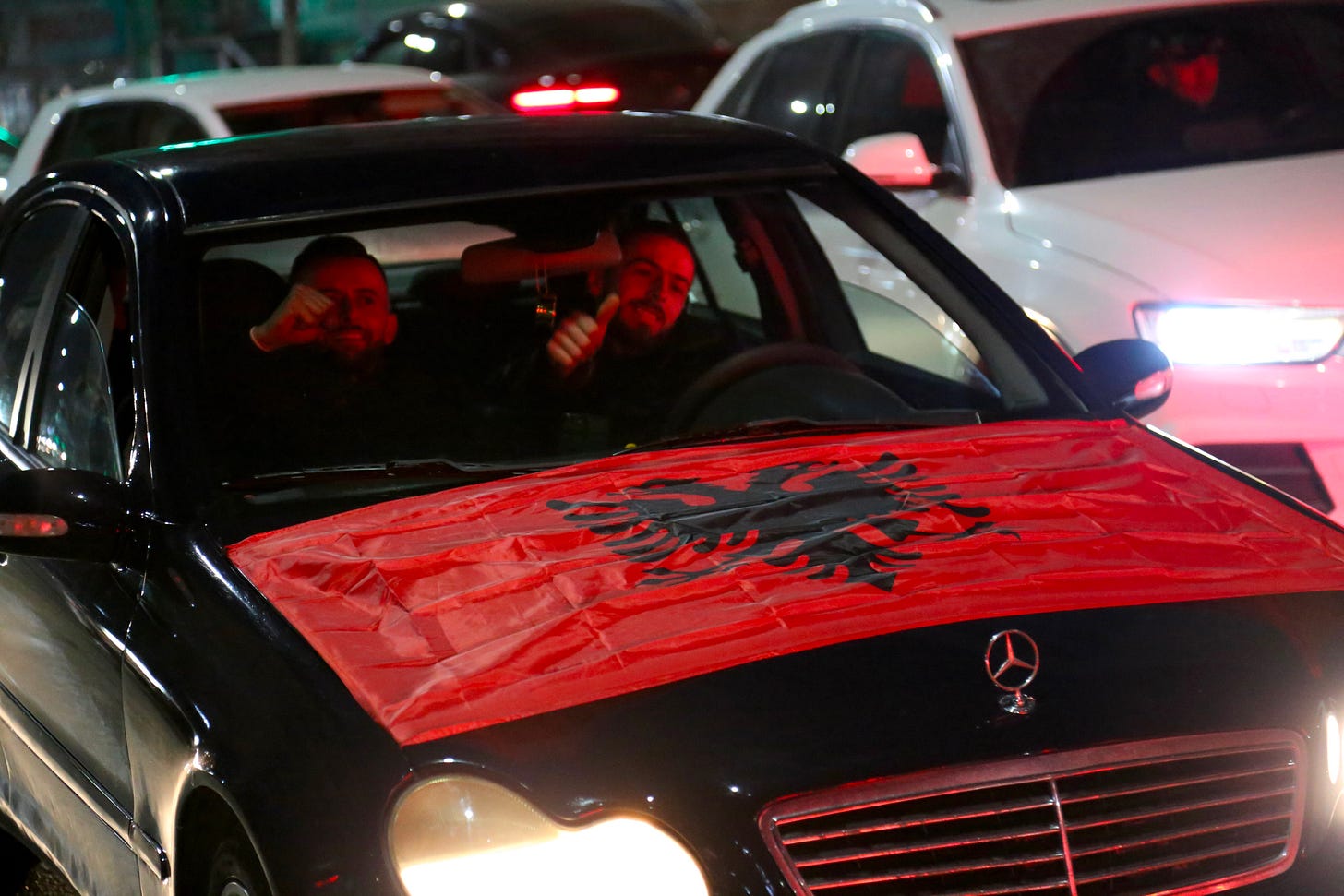S5E20. You never forget your first vote
For the very first time, the Albanian diaspora was allowed to participate in the elections—a democratic right that many people, born or raised in other European countries, had never exercised before
Dear reader,
welcome back to BarBalkans, the newsletter with blurred boundaries.
There are moments in a country’s history that become cornerstones of collective memory—a sporting triumph, a natural disaster, or sometimes, an election.
This is what happened on 11 May 2025 in Albania. Marking the 35th anniversary of the return of democracy, these were the first parliamentary elections in which the Albanian diaspora was granted the right to vote.
This was no small event, especially considering that Albanian citizens living abroad make up roughly one third of the country’s total population.
Yet beyond the numbers, what truly demands our attention is the deep and complex significance that voting from abroad holds for these people.
For many, it has been their first-ever vote. For just as many, the foreign countries where they are born or raised are hindering their ability to become full citizens. And despite doubts and uncertainties, their determination to exercise a democratic right prevailed.
Read also: S4E21. One vote can change everything
BarBalkans is a newsletter powered by The New Union Post. Your support is essential to ensure the entire editorial project continues producing original content while remaining free and accessible to everyone.
The importance of the Albanian diaspora
Today, our focus is not on the outcome of the parliamentary elections held on 11 May (for further details, see the article published by The New Union Post), but on understanding why the Albanian diaspora’s vote is so crucial, and what role it plays—and will continue to play—in the country’s future.
With a population of approximately 2.7 million, Albania has a significant proportion of its citizens living abroad, estimated at around 1.5 million.
Put simply, the diaspora accounts for roughly one third of Albanian citizens, making it one of the largest in the world relative to its national population.
The largest Albanian communities outside Albania live in Europe and North America, having grown substantially following waves of mass emigration, particularly during the 1990s and early 2000s.
According to available data, the vast majority of the diaspora reside in Italy and Greece—around 400,000 in each country—while Germany (250,000), Switzerland, and the United States (each with approximately 200,000) are other main destinations. Around 40,000 Albanian citizens live both in Canada and the United Kingdom.
Read also: S4E1. Anilda Ibrahimi. Overcoming limits
Analysing these figures, it is clear why the diaspora is a significant factor in Albanian elections.
Following amendments to the Electoral Code in July 2024, Albanian citizens living abroad were able to vote by post in the 2025 parliamentary elections, for the first time since the fall of the communist regime in 1990.
Of the estimated 1.5 million Albanians living overseas, 245,935 registered to vote—approximately 16%. It must be noted that this figure includes those under 18, who are not yet eligible to vote.
The Italian paradox
“Before these elections, I had never voted in my life—I was the only one in my family. My parents had voted in Albania. My sister, born here and granted citizenship at 18, had already voted in Italy.” Gabriele K., 32, from Pisa, shares an experience familiar to tens of thousands of young people in Europe.
However, the Italian paradox—where the vote of foreign diasporas intersects with the particularly strict criteria for granting citizenship to those born or raised in Italy, but not to Italian parents—deserves explanation.
Gabriele arrived in Italy in 1999, “at the age of six, just as I was starting primary school.” Over two decades later, “I still don’t have Italian citizenship due to issues linked to employment.”
Foreign nationals can apply for Italian citizenship after ten years of regular and uninterrupted residence, provided they meet a range of economic requirements—including a minimum gross annual income of €8,500. That is before even factoring in the bureaucratic delays, which can take up to three years just to process an application.
For minors born in Italy who have maintained continuous regular residence, citizenship can be obtained at age 18—but only if they apply within 365 days of coming of age. If this deadline is missed, the automatic right is lost, and the ten-year process starts anew.
For those who arrive after birth, things are different. If a minor turns 18 before their parents are granted citizenship, their application is detached from the family process. As a result, the individual must start from scratch, facing the full ten-year residency requirement along with stringent conditions of “stable and sufficient” income.
This applies even to someone who has spent nearly their entire life in Italy—someone who may not remember their early years in another country, who has grown up, studied, played sports, built relationships, worked, paid taxes and contributed to society. Even if they are, in every meaningful sense, Italian.
“To be honest, I was conflicted about whether to vote. I thought of all the second-generation people like me, voting for Albania despite never having really lived there,” says Gabriele. “But I wanted to exercise a democratic right—and it didn’t feel right that I had never been able to do so before.”
Read also: S5E4. Eva Murati: Stay true to your passion
As Gabriele explains, “voting from abroad like this—having lived outside Albania my entire life, not just for a few years—feels strange in a way. You are thinking about what is best for others, not directly for yourself.”
From 2024, it has become his legal right to elect representatives to the Albanian Parliament. Yet, the reality for him—and many other Albanians who grew up in Italy—is more complex. “Politics there affect me only very indirectly, and from afar,” he says.
It always comes back to the same point: “I have spent almost my whole life in Italy. I go back to Albania occasionally for holidays. After all, I don’t know what everyday life is like there, beyond the stories from my relatives or brief experiences of a few weeks.”
And yet, in Italy—where everyday events shape his life directly—“I can’t vote, and I have no way of taking part in the decisions that affect me.”
In other words, “it would make far more sense to have the right to vote in Italy. This is where I have always lived, where I pay taxes, where I have built relationships, and where I experience positive and negative consequences of of politics,” Gabriele points out.
“Eventually, all of this began to weigh on me, even as a politics enthusiast. I wanted to be able to say ‘I voted’ too.”
Read also: S4E7. Can we really trust Edi Rama?

Pit stop. Sittin’ at the BarBalkans
We have reached the end of this piece of the road.
Today at our bar, the BarBalkans, whether in Albania or abroad, we are sharing a traditional drink that the Albanian diaspora has introduced across Europe.
Lëng thane is a juice made from the fruit of the cornel tree—known as thana in Albanian—a small, sour, dark red berry.
To make lëng thane, the fruits are first boiled. The mixture is then left to cool while being pressed to extract as much juice as possible. The liquid is finally strained and stored in glass bottles.
This juice is known for its refreshing flavour and is also consumed for its health benefits.
Let’s continue BarBalkans journey. We will meet again in two weeks, for the 21st stop of this season.
A big hug and have a good journey!
Behind every original product comes an investment of time, energy and dedication. With your support The New Union Post will be able to elaborate new ideas, articles, and interviews, including within BarBalkans newsletter.
Every second Wednesday of the month you will receive a monthly article-podcast on the Yugoslav Wars, to find out what was happening in the Balkans 30 years ago.
You can listen to the preview of The Yugoslav Wars every month on Spreaker.
Discover Pomegranates, the newsletter on Armenia and Georgia’s European path powered by The New Union Post
If you no longer want to receive all BarBalkans newsletters, you can manage your preferences through Account settings. There is no need to unsubscribe from all the newsletters, just choose the products you prefer!






